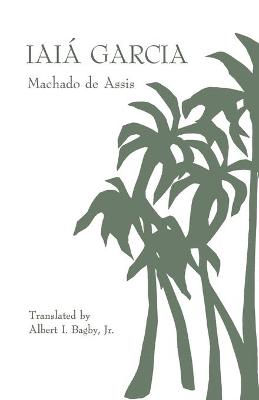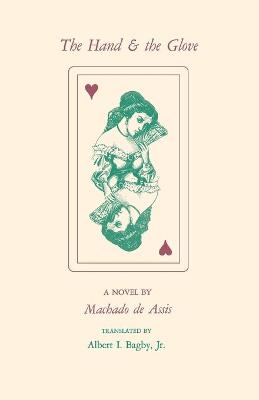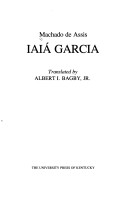Studies in Romance Languages
3 total works
The last of four novels that preceded Machado de Assis's famous trilogy of realistic masterpieces, Iaiá Garcia belongs to what critics have called the Brazilian author's "romantic" phase. But it is far more than that implies. Like his other early works, Iaiá Garcia foreshadows the themes and characters of Assis's most masterful novels.
Iaiá Garcia intertwines the lives of three characters in a subtly and wryly developing relationship. While the youthful Iaiá is growing into womanhood, a tentative love affair occurs between the aristocratic Jorge and the prideful Estela. This affair is afflicted by ironic shifts of fortune and in time the maturing Iaiá becomes a rival for Jorge's attentions. Assis's portrayal of the relationship among these three characters is a perceptive study of uncompromising pride, thwarted love, jealousy, misunderstanding, bewilderment, and attainment.
As the translator, Albert I. Bagby, Jr., contends, the story of Iaiá, Jorge, and Estela reflects the formula that Assis saw as fundamental to human life: "Will and ambition, when they truly dominate, can struggle with other feelings, but they are the weapons of the strong, and victory belongs to the strong." In Assis's view success comes to the strong and failure to the weak. But both inhabit a world that is neutral-neither helping one nor hindering the other. The outcome of events in Iaiá Garcia may not seem entirely optimistic, but neither is it pessimistic. And Mr. Bagby concludes, "Perhaps to understand the optimism of Assis one needs only to be... a hard, pragmatic realist.... "
Whether hard realists or unregenerate romantics, readers of this novel will find it a compelling tale of love lost and won. Like his earlier translation of Assis's The Hand & the Glove, Mr. Bagby's English rendering of Iaiá Garcia from the original Portuguese is done with both accuracy and sensitivity.
Iaiá Garcia intertwines the lives of three characters in a subtly and wryly developing relationship. While the youthful Iaiá is growing into womanhood, a tentative love affair occurs between the aristocratic Jorge and the prideful Estela. This affair is afflicted by ironic shifts of fortune and in time the maturing Iaiá becomes a rival for Jorge's attentions. Assis's portrayal of the relationship among these three characters is a perceptive study of uncompromising pride, thwarted love, jealousy, misunderstanding, bewilderment, and attainment.
As the translator, Albert I. Bagby, Jr., contends, the story of Iaiá, Jorge, and Estela reflects the formula that Assis saw as fundamental to human life: "Will and ambition, when they truly dominate, can struggle with other feelings, but they are the weapons of the strong, and victory belongs to the strong." In Assis's view success comes to the strong and failure to the weak. But both inhabit a world that is neutral-neither helping one nor hindering the other. The outcome of events in Iaiá Garcia may not seem entirely optimistic, but neither is it pessimistic. And Mr. Bagby concludes, "Perhaps to understand the optimism of Assis one needs only to be... a hard, pragmatic realist.... "
Whether hard realists or unregenerate romantics, readers of this novel will find it a compelling tale of love lost and won. Like his earlier translation of Assis's The Hand & the Glove, Mr. Bagby's English rendering of Iaiá Garcia from the original Portuguese is done with both accuracy and sensitivity.
The later novels of Machado de Assis -- notably Dom Casmurro and Esau and Jacob -- are well known in this country, but the earlier novels have never been translated. Here, in The Hand and the Glove (the Brazilian master's second novel), rendered in English for the first time by Albert I. Bagby, Jr., readers will find a younger, gentler Assis, writing a romantic comedy that is yet permeated with the lively wit characteristic of his later works.
The story is a simple one-of love lost and love found. Of love lost by Estêvão, amiable but vacillating, who is bemused by his own romantic posturing, and by Jorge, superficial and calculating. Of love found by Luis Alves, whose self-possession and determination seem destined to carry him far. The love of all three men is the proud and beautiful Guiomar, sure of her own heart but unsure, until faced by rival claims, of where to bestow it -- a foreshadowing of Capitú, the intriguing heroine of Dom Casmurro.
"English-speaking readers," says Helen Caldwell in the Foreword, "who are already acquainted with Machado de Assis will welcome this latest addition to the translated novels. True, it is a period piece; but its quaintness is a charm to carry us back to the Rio de Janeiro of the 1850s -- to vanished courtly elegance arid attitudes.... Now, we too can know what drew [Assis] back to this early tale, for The Hand and the Glove recreates in English the elegant background, the charming heroine, the comedy, and the light-hearted ebullience of the Portuguese original."
The story is a simple one-of love lost and love found. Of love lost by Estêvão, amiable but vacillating, who is bemused by his own romantic posturing, and by Jorge, superficial and calculating. Of love found by Luis Alves, whose self-possession and determination seem destined to carry him far. The love of all three men is the proud and beautiful Guiomar, sure of her own heart but unsure, until faced by rival claims, of where to bestow it -- a foreshadowing of Capitú, the intriguing heroine of Dom Casmurro.
"English-speaking readers," says Helen Caldwell in the Foreword, "who are already acquainted with Machado de Assis will welcome this latest addition to the translated novels. True, it is a period piece; but its quaintness is a charm to carry us back to the Rio de Janeiro of the 1850s -- to vanished courtly elegance arid attitudes.... Now, we too can know what drew [Assis] back to this early tale, for The Hand and the Glove recreates in English the elegant background, the charming heroine, the comedy, and the light-hearted ebullience of the Portuguese original."


